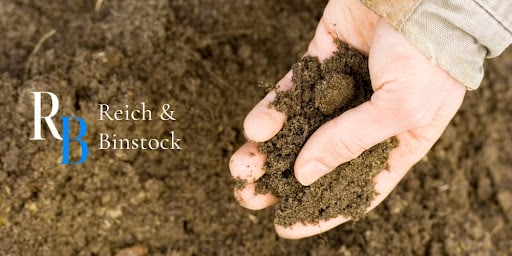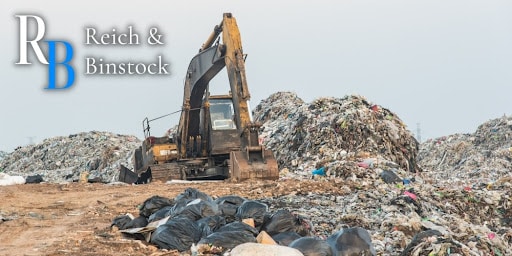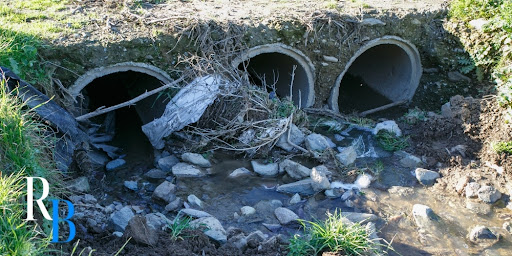Soil Contamination Lawyers
PRACTICE AREAS

It’s a fairly straightforward concept that contaminated water can negatively affect human health. But did you know that contaminated soils can also lead to human health risks? Any form of contamination of the environment has the potential for far-reaching consequences. Even if the soil contaminants were dumped or placed somewhere a long time ago, these hazardous substances could leach upward over time. This leads to property contamination of yards and homes, which can then lead to an accessibility or usability issue, or even degradation of property value. Soil contamination is a serious issue that not many people know about, but that many people suffer from.
At Reich & Binstock, our environmental litigation attorneys have extensive experience handling claims related to soil and ground water contamination. If your property’s soil is contaminated with toxic chemicals, radioactive materials, or other pollutants, you may be eligible for compensation. To schedule your free case evaluation with us, please call our law firm at 713-622-7271 today.
What Is Soil Contamination?
Soil contamination occurs when toxic substances are present in the soil in high enough concentrations to negatively affect public health, animal health, or the ecosystem as a whole. However, soil contaminants don’t necessarily have to be found in very high concentrations in order to qualify as a contaminated site. Soil contamination happens when any contaminant is found in the soil that is at a higher level than what would naturally occur.
The Environmental Protection Agency (EPA) is responsible for tracking, documenting, monitoring, and regulating contaminated sites. This applies to both contaminated soil and drinking water. However, the EPA can only monitor so much by themselves. Therefore, certain pollutants may find their way into the soil and become undetectable before the EPA can get involved. When this happens, communities, farms, homes, and businesses may suffer the consequences. Victims may have the opportunity to file a class action lawsuit with the help of an experienced toxic tort law firm.
How Does Soil Contamination Happen?

While it is true that many naturally occurring contaminants (heavy metals) can be present in the soil, man-made contaminants often have the potential to be highly deadly. Below, we outline how natural contaminants and contaminants from human activities can enter the soil.
- Natural causes: Certain natural processes can lead to contamination of the soil. For example, microbial activity and organism decomposition often deposit organic compounds into the soil. In great quantities, these compounds can have adverse health effects. Other natural causes of soil pollution include rain, wind, surface water contamination, and groundwater contamination.
- Anthropogenic causes: Human causes generate a large number of contaminants in the soil, both organic and inorganic. Examples of anthropogenic causes of contamination include air pollution, improper waste disposal, industrial waste, leaking underground tanks, and agricultural runoff.
Sources of Soil Pollution
As we mentioned previously, both organic and inorganic compounds can contaminate the soil. Some of them occur naturally and build up over time, while others cross natural boundaries into the soil from the air or water. Regardless of the source of contamination, it is imperative to seek legal counsel if you have been affected by environmental contamination of any kind. Below, we list several organic and inorganic soil contaminants.
- Heavy metal compounds (lead, arsenic, copper, mercury, nickel, zinc)
- Manure and fertilizer
- Animal waste
- Pesticides and herbicides
- Radioactive contaminants (uranium, nitrogen, radium, etc.)
- Garbage, sludge, sewage, and litter
- Industrial waste (textiles, petroleum, gas, glass, drugs)
What Is the Most Common Soil Contaminant?
You may think that naturally-occurring heavy metal compounds are the most common soil contaminants. However, there are many others that also pollute the soil to a high degree. The following pollutants are among the most common soil contaminants.
- Oil and natural gas
- Fuel, garbage, and other organic materials
- Agrochemicals such as insecticides, herbicides, and fungicides
- Certain solvents
- Lead and other heavy metals
- Asbestos
What Is Property Contamination?

Soil contamination is a form of property contamination, as the two are often closely related. Those whose property becomes contaminated can work with an experienced law firm to file a claim for environmental property damage. Someone’s property can become contaminated through the soil, the air, or the water on their property.
Types of Property Contamination
Many different types of property contamination exist, some organic and some inorganic. Below, we list some of the sources of property contamination that our legal team has seen over the years.
- Air pollution
- Water contamination
- Groundwater contamination
- Surface water contamination
- Soil contamination
- Fracking
- Agricultural pollution
- Mold infestations
- Fuel spills
- Industrial chemical contamination
- Injection well pollution
What Are the Effects of Soil Contamination?
A wide range of health issues can occur as a result of soil contamination. While some cause only minor discomfort, others can result in lifelong health issues, or even death. Below, we list several injuries and illnesses that can occur as a result of contaminated soil.
- Nervous system problems
- Heart disease
- Allergic reactions
- Cancer
- Reproductive issues
- Heavy metal poisoning
- Developmental problems
- Immune deficiencies
How Can Soil Contamination Affect Me?
Human exposure to contaminated soil can happen in a few different ways. Below, we list the ways in which unsuspecting victims may suffer from the harmful effects of contaminated soil.
- Ingesting contaminated soil: You may wonder how someone could accidentally ingest contaminants through the soil. While it may not be a significant concern for adults, young children are known to put many things in their mouths other than food, including dirt and soil. As children grow and play, they may try to eat soil or mud, or even inhale dust particles. Contaminate soil could also be present on produce that you buy from the grocery store. This is one reason why thoroughly washing your produce is so important.
- Inhaling dust and debris: If the soil has no cover, such as grass or plants, it is vulnerable to becoming dry and dusty in windy weather. Certain dangerous chemicals can lead to health problems if someone accidentally inhales soil contaminated with those chemicals. Other sources of soil inhalation include construction work, building demolitions, and mining operations.
- Absorbing through the skin: It is also possible to suffer from land pollution via absorption through the skin. If someone’s skin comes into contact with contaminants in the soil, the skin may absorb contaminants, then redden or blister over time.
- Eating food grown in contaminated soil: Neglecting to test the soil before growing food in it is another source of contamination. If the site was once an area of industrial activity, excessive pesticide use, or even a demolished building, it is possible that the soil could be contaminated. Many contaminated foods absorb these chemicals as they grow. Additionally, even farms with uncontaminated soils can become contaminated by nearby polluted soil.
Can Contaminated Soil Be Cleaned?
While it is technically possible to clean or remediate contaminated soil, the processes for doing so are often very time-consuming and costly. The average consumer may not have the financial means to clean up their property if they discover contamination. However, the ability to clean the soil heavily depends on what contaminants are present. Some are much easier to clear away than others.
Do I Need an Attorney for Soil Contamination?

While it isn’t a requirement to hire an attorney for your soil contamination case, it is often a much better idea to have a legal representative than to go it alone. The laws and regulations regarding environmental contamination of any kind tend to be extremely complicated. Additionally, large companies and manufacturers that could be responsible for the contamination often have whole teams of lawyers to defend against lawsuits. As a single person or household, you are much better off working with an experienced toxic tort attorney for your soil contamination lawsuit.
Contact a Soil Contamination Attorney Today
At Reich & Binstock, our legal team is dedicated to representing those suffering from the effects of soil and water contamination. We understand that discovering contamination on your property can be extremely frustrating, especially if you or your loved ones have suffered health problems as a result. Our law firm is here to represent those whose properties have suffered as a result of soil contamination or water contamination. To schedule your free case evaluation with us, please call our office at 713-622-7271 today.
There is never a fee unless we recover on your behalf.












